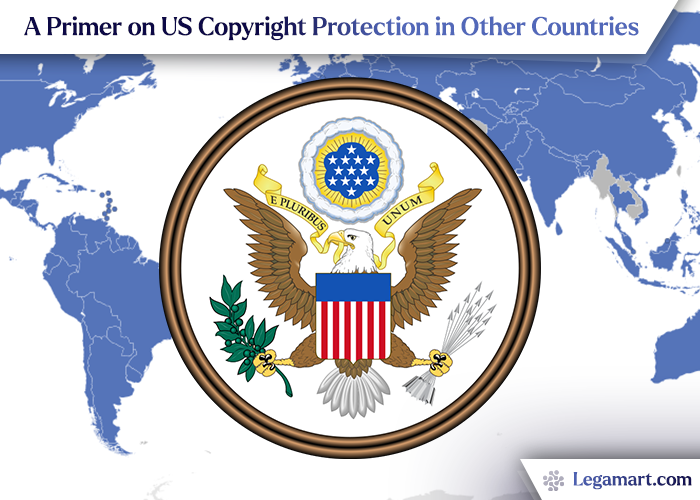“I support copyright. I mean, it’s intellectual property, a thought process of someone, and those things should always be protected.” – Jeff Mills
Imagine putting your heart and soul into building something for yourself and society, only to find someone—perhaps even from overseas—trying to steal your work. You’ve registered your work in the US, but now you’re wondering if that’s enough. In the realm of Cross-Border & International Law, one key question arises: does US copyright protection cover your work internationally?
Check out this Primer on US Copyright Protection in Other Countries for all the answers you need.
Is US Copyright Protection Effective Abroad?
I have one bad news and one good one for you.
So, the bad news is “NO” the US copyright doesn’t protect your work in other countries, and there’s nothing like an “International copyright law” that guarantees the work will remain protected in other countries.
The good news is that international conventions can protect your intellectual property. These international conventions provide reciprocity protection for citizens of the signatory countries. One such example is the principle of national treatment, in which the copyright owner receives the same protection as if they were nationals of the country where the infringement is taking place and are given the same level of protection for their copyrights as their citizens.
The four conventions that help you protect your copyright work in other countries:
- Berne Convention: This convention was adopted in Berne, Switzerland, in 1886 and has 179 signatories as of today. It protects literary and artistic works for 50 years after the author’s death.
- Universal copyright convention: UCC came into existence in 1952 as an alternative multilateral treaty of UCC for the countries that needed much flexibility and easier compliance with the convention as compared to Berne. The convention provides 25 years of copyright protection after the author’s death.
- The Rome Convention (Rome): This convention protects copyright in areas other than those covered by the above conventions. It provides copyright protection for 20 years to broadcasting owners, producers, and performers.
- WIPO Copyright Treaty: The treaty has 110 contracting parties. First signed on 20 December 1996 with 30 ratifications. WIPO provides copyright protection to computer databases and programs.
What are the Benefits of Having a Copyright Registration for your Work?
When a work is created and fixed in tangible form, it is presumed to have copyright, but it gives little to no protection. On the other hand, if you have registered your work, you will have the following benefits:
- You can bring a lawsuit in case of copyright infringement of your work.
- It makes you eligible to seek maximum damages from the defendant.
- It creates a public record.
- It proves the validity of the copyright.
- It increases the goodwill and credibility of the author.
Registering your work becomes imperative in the realm of social media, where the risk of infringement is heightened. Beyond safeguarding creators, copyright registration becomes a strategic shield against potential infringers on social media platforms, reinforcing the message that unauthorized use carries legal consequences,
Are Copyright Laws the Same as in Other Countries?
No, copyright laws are different for each country. They are limited to their territory, hence have a different standard of what will be qualified as copyright, what will be the duration for the copyright protection, and what will constitute infringement.
How do We Sue a Non-US citizen for Copyright Infringement?
Having international conventions indeed gives a route on how we can sue a non-US citizen, but still suing a non-US citizen can be daunting, expensive, and a time-consuming task.
Every country has its own copyright law, which is territorial in nature, which means it has limited scope to its nationality, and so does the United States. The copyright law of the United States is governed by the copyright act 1976, so before you sue a non-US citizen for copyright, make sure to follow these steps and make yourself familiar with the US laws:
- Register your work in the US copyright office. While copyright starts to exist when an author creates an original work and fixes it in a tangible medium, one must register it with the US copyright office to file an infringement suit.
- Check for the convention your work falls in and if your country is a member of that convention.
- Analyze the situation: You need to check how this infringement took place. Check the following scenarios:
- If a person “A” infringes on your copyright in a different country, then you must sue that person in the country where A resides.
- However, if copyright infringements have happened, and importation or exportation of the copies has been acquired from the US or imported to the US, while the owner of that work is in the US, in both instances, you can bring a suit in the US court. Consequently, these acts violate section 106 and constitute an actionable offense under section 501.
Conclusion
In a nutshell, a person whose copyright has been infringed by a non-US citizen living in a different territory must be prepared to file a lawsuit in a foreign territory. Please note that the convention does not specify which court will have jurisdiction over copyright infringement cases. No law exists that answers this question and brings an end to this uncertainty. Hence, it’s always advisable to seek legal advice from a local lawyer in the area where you intend to sue the person.
Uncover the steps and procedures for immigration to different nations, with a focus on Turkey to Norway and US to Portugal, in Legamart‘s insightful articles.




